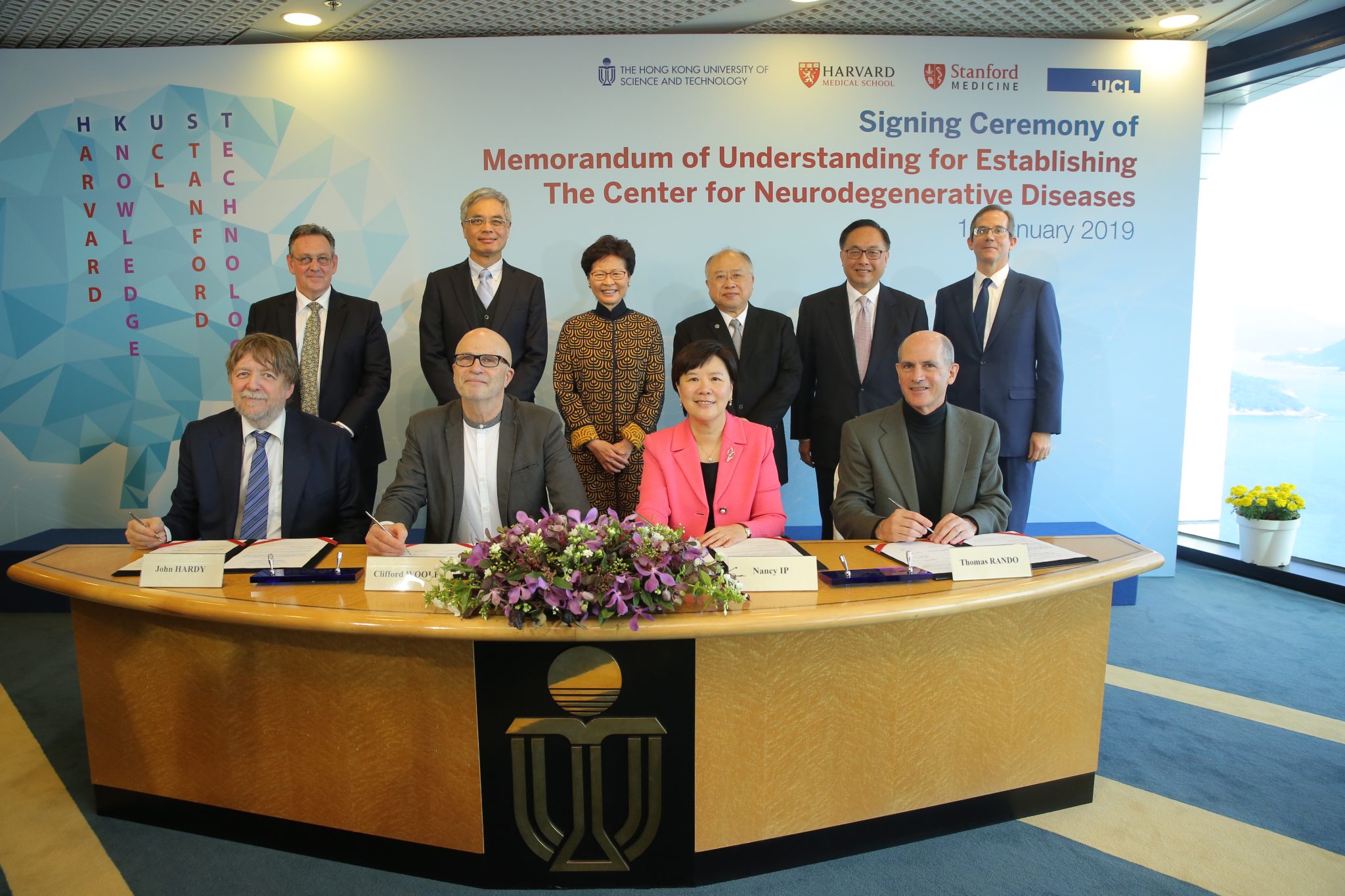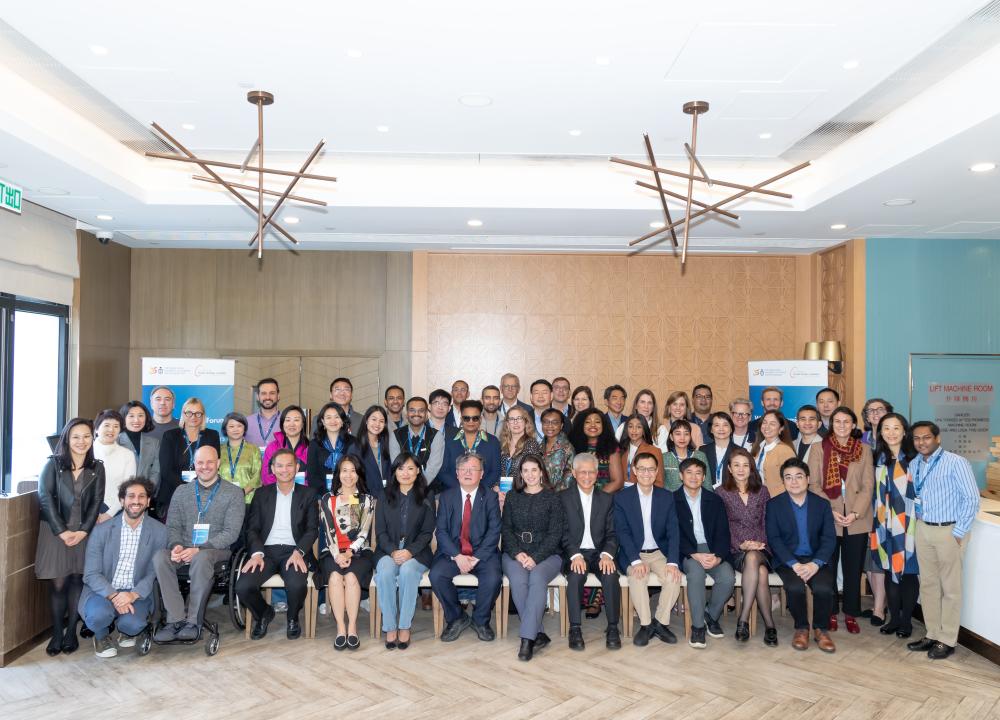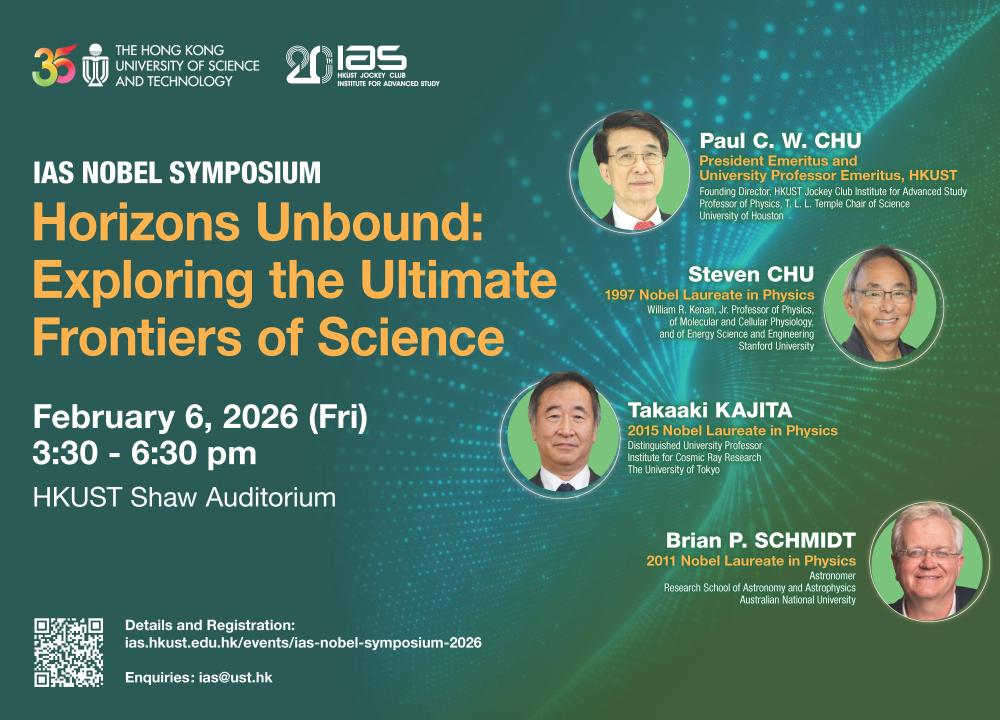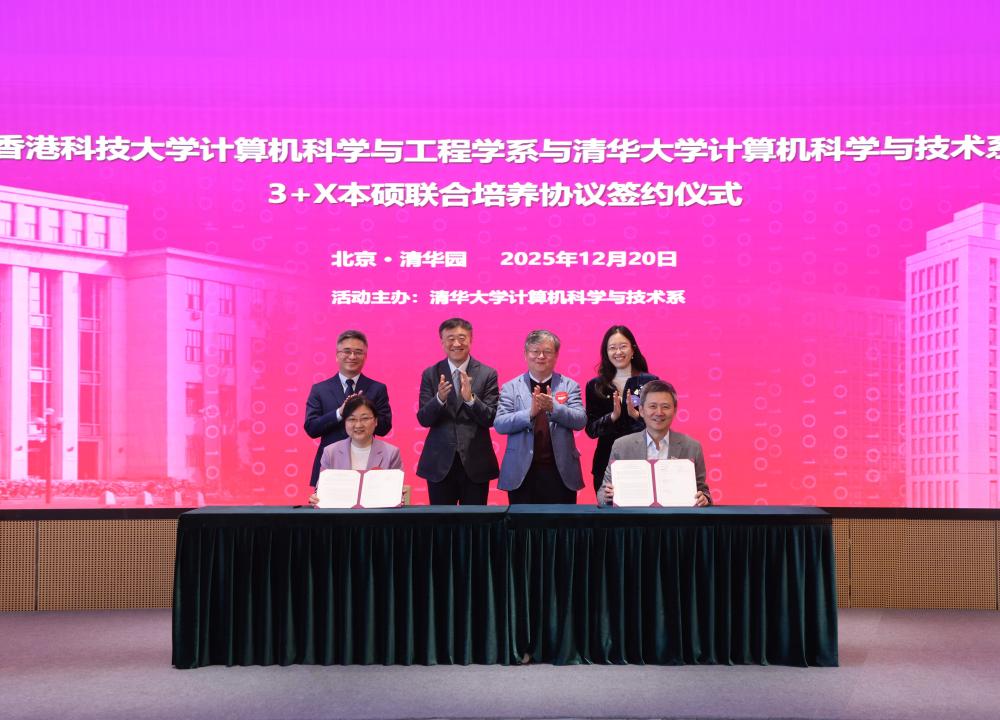Fighting Neurodegenerative Diseases
The Hong Kong University of Science and Technology (HKUST) signed a landmark Memorandum of Understanding (MoU) together with Boston Children’s Hospital – a Harvard Medical School Teaching Hospital (Harvard), the Paul F. Glenn Center for the Biology of Aging at Stanford University School of Medicine (Stanford), and University College London (UCL) today, signifying a partnership to engage in advanced translational neuroscience research.
The momentous occasion was witnessed by The Hon Mrs. Carrie LAM Cheng Yuet-Ngor, Chief Executive of the Hong Kong Special Administrative Region (HKSAR); Mr. Andrew LIAO Cheung-Sing, Council Chairman of HKUST; Prof. Wei SHYY, President of HKUST; Mr. Nicholas W YANG, Secretary for Innovation and Technology; and diplomatic representatives including Mr. Andrew HEYN, British Consul General in Hong Kong.
The MoU represents an exciting first step towards a significant strategic partnership among the four renowned institutions to undertake innovative and pioneering translational neuroscience research. They intend to establish the Center for Neurodegenerative Diseases and apply to join the Health@InnoHK research cluster program. The Center will provide a synergistic platform for scientists from HKUST, Harvard, Stanford and UCL to consolidate their strengths and expertise, build knowledge and understanding across multiple disciplines through concerted effort, and engage in research with significant societal impact.
Chief Executive of HKSAR Mrs. Carrie Lam said, “This milestone occasion brings together four of the world’s leading universities for – and from three continents – pioneering medical research here in Hong Kong. I am hopeful that the combined excellence and collective commitment and expertise of four of the world’s leading institutions, and their scientists and researchers, can lead to significant advances in the diagnosis and treatment of neurodegenerative diseases.”
HKUST Council Chairman Mr. Andrew Liao expressed his gratitude for the government’s determination in promoting science and research in the city, “The government has committed both funding and efforts to building an environment for Hong Kong’s development in science and innovation. As a world-class research university, it is our pleasure and responsibility to contribute to the city’s health sector by creating a platform for these top-notch researchers. I look forward to significant breakthroughs being made by the Center in the near future.”
Addressing the audience, President Prof. Wei Shyy said, “Our partnership with these universities will mark a major step forward in the understanding of neurodegenerative diseases and the development of new diagnostic tools and treatments, which are crucial amid problems posed by an aging population around the world.”
Foundational work at the Center will focus on Alzheimer’s disease (AD), the most prevalent neurodegenerative disease and one of the top 10 leading causes of death in the elderly. This incurable disease, which afflicts almost 47 million people worldwide, is rapidly increasing due to aging populations worldwide, and is projected to reach 131.5 million by 2050. While AD exacts a huge financial and emotional toll on patients and their families, the cost of care and loss of productivity from the disease incur massive economic burden to societies. With one of the longest life expectancies in the world, Hong Kong faces an onslaught of AD cases, especially since 39% of the population will be over the age of 65 by 2050.
“Alzheimer’s disease is a major health crisis of our time but limited knowledge of the disease is hindering the development of urgently-needed diagnostics and therapeutics,” said Prof. Nancy IP, Vice-President for Research and Development at HKUST and the project lead. “The Health@InnoHK initiative provides the ideal platform to bring together leading minds in the field to accelerate progress in understanding this devastating disease. “
Three major inter-related research programs will be initiated with the goals of developing AD biomarkers for disease monitoring and therapeutic strategies, as well as identifying systemic factors and therapeutic targets for treating the disease. By establishing the most advanced technological pipelines, platforms, and models, the multi-institutional project team also aims to generate new insights on disease pathways to drive translational research efforts in developing improved treatments and tools for early diagnosis.
To further expand the breadth of expertise of this initiative, we also have the support of researchers from the University of Tokyo, and have collaborations with local clinicians at the Queen Elizabeth Hospital, the Prince of Wales Hospital, and the Haven of Hope Christian Service in engaging local patient groups, which is critical for the development of personalized medicine.
The Center’s activities will also create immense training opportunities for the next generation of scientists, and in the long run, establish a collaborative scientific hub for neurodegenerative disease research in Hong Kong.
About The Hong Kong University of Science and Technology
The Hong Kong University of Science and Technology (HKUST) (www.ust.hk) is a world-class research university that focuses on science, technology and business as well as humanities and social science. HKUST offers an international campus, and a holistic and interdisciplinary pedagogy to nurture well-rounded graduates with global vision, a strong entrepreneurial spirit and innovative thinking. HKUST attained the highest proportion of internationally excellent research work in the Research Assessment Exercise 2014 of Hong Kong’s University Grants Committee, and is ranked as the world’s best young university in Times Higher Education’s Young University Rankings 2018. Its graduates were ranked 16th worldwide and top in Greater China in Global University Employability Survey 2018.
For media enquiries, please contact:
Anita Lam
Tel: 2358 6313
Email: anitalam@ust.hk
Jamie Wong
Tel: 3469 2512
Email: jamiewong@ust.hk













